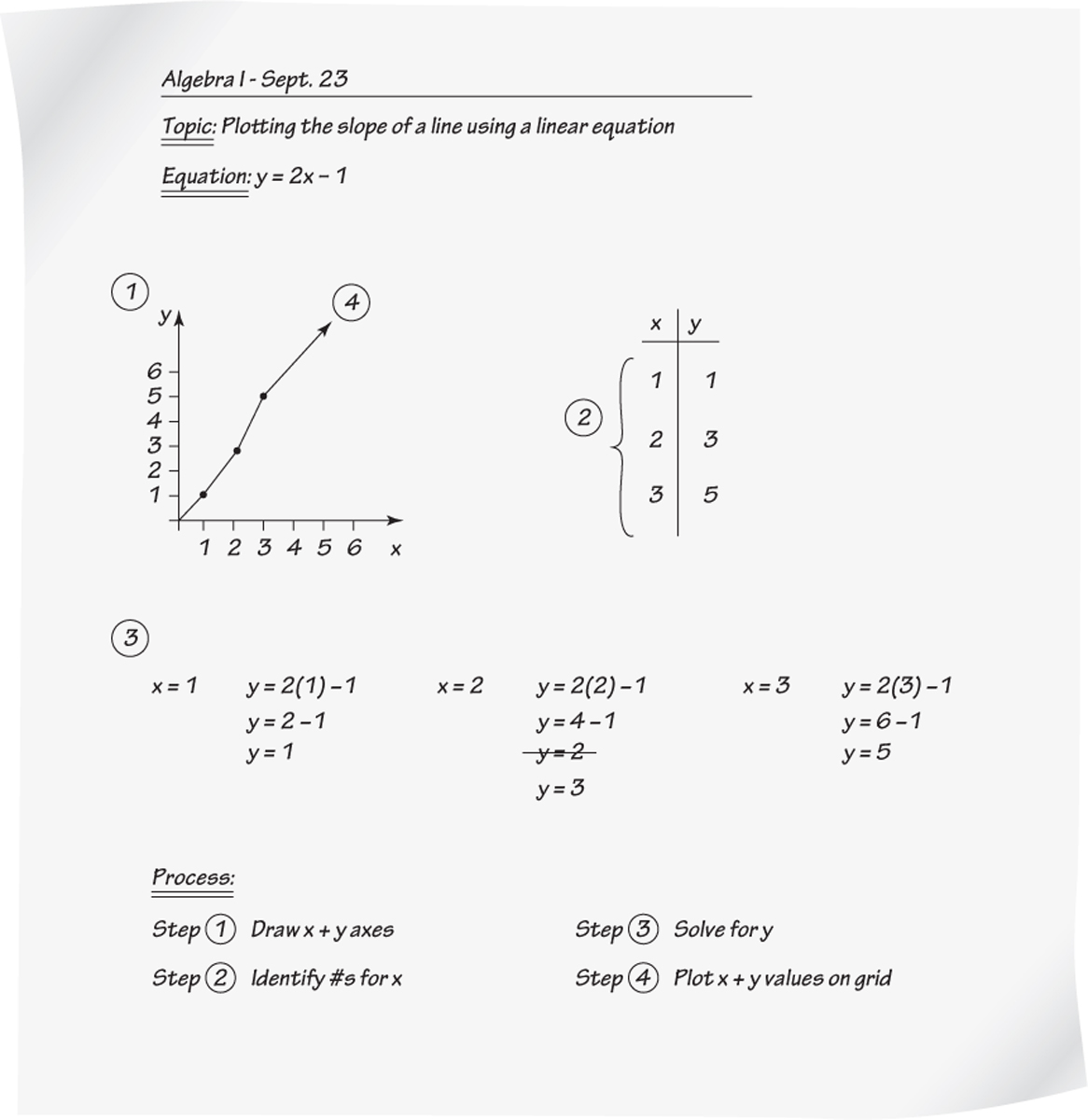Note-Taking Tips for Math, Science, and Online Classes
The basics of note taking apply in most learning situations: You need to prepare, focus, record, and review information, whether you’re taking computer science or composition. But science, math, and online classes have unique characteristics, so additional, specialized strategies can come in handy. In science and math classes, for example, you’ll come across a lot of formulas, diagrams, and equations. You’ll need to record these quickly if you’re in lecture, and record them accurately both in class and while reading. And online classes don’t have traditional lectures at all, so you’ll take notes on other types of information. By adjusting your strategies to account for these differences, you can record the information you need efficiently and effectively.
CONNECT
TO MY CLASSES
Identify your most challenging class. Which of the note-taking methods described in this chapter would work best for you in that class? Jot down two reasons you think this method would be a good fit for that course.
Taking Notes in Math and Science Classes
Whether you take one math or science class or ten over your college career, try these strategies for taking good notes.
Be ready to record formulas and equations. Formulas and equations are sentences written in mathematical notation. When you write down a formula or an equation, carefully record and label each of the components or steps in the process. Where appropriate, also note how the formula or equation is used.
Leave space in your notes. Leave enough room in your notes to draw diagrams, write formulas and equations, and copy down problems. Also leave space to record each step as you solve problems and to show your work (see steps 1–4 in Figure 7.6).
Use good scientific laboratory practice. If you think you’ve made a mistake in a formula, an equation, or a diagram, don’t erase or scratch out everything you’ve written. Instead, draw one or two lines through the part containing the mistake. These lines will help you trace your thinking later and find errors that need fixing. To create a clean version, rewrite the material on a new page of notes.
Keep writing if you get off track. If you fall behind the lecture when writing down a problem or a diagram, mark where you got off track and keep writing down what your instructor is saying. You want to record as much of the information as possible — you can always go back later to fill in what you missed.
Learn the shorthand. In your math or science classes, learn the shorthand for those fields. For instance, if you know that Hz = hertz and d = distance in physics, or that BTU = British thermal unit in chemistry, you’ll take notes faster and better understand what the information means.
Ask for help when you need it. If you don’t understand a concept, talk with a tutor or your instructor to get clarity. Because math and science classes tend to be linear (meaning information builds from class to class), you need to clear up any confusion immediately to stay on track. Moreover, forming a good relationship with your instructors will help you succeed in these classes.4

Taking Notes in Online Classes
The note-taking strategies you use for traditional classes are the same for online classes and hybrid classes (a blend of face-to-face and online). But online classes don’t meet as regularly as face-to-face classes, so students sometimes fall behind and cut out time to take notes. To avoid this scenario, make sure you spend as much time taking notes in your online class as you do in your other classes. For example:
When you watch videos or listen to audio recordings of lectures, take notes.
When you read online, take notes.
When someone makes an important point on the class’s discussion board, take notes.
And don’t forget to manage your time. When your instructors post recorded lectures online, resist the impulse to spend less time (or no time) taking notes, on the assumption that you can always go back and view the lectures again. You can — but it’s more efficient to view lectures just once and take good notes rather than having to watch them several times because your notes are incomplete.
FURTHER READING: Erman Yukselturk and Safure Bulut examine what variables influence student success in their article “Predictors for Student Success in an Online Course,” published in the journal Educational Technology & Society (2007).
